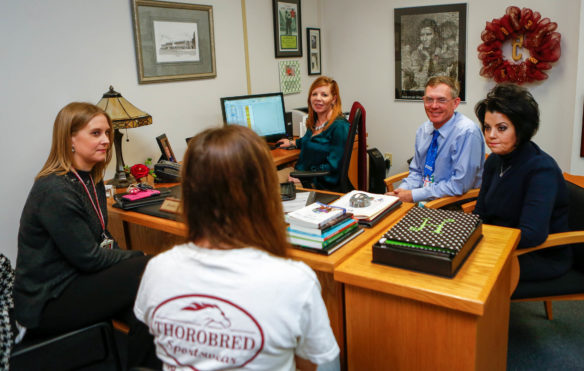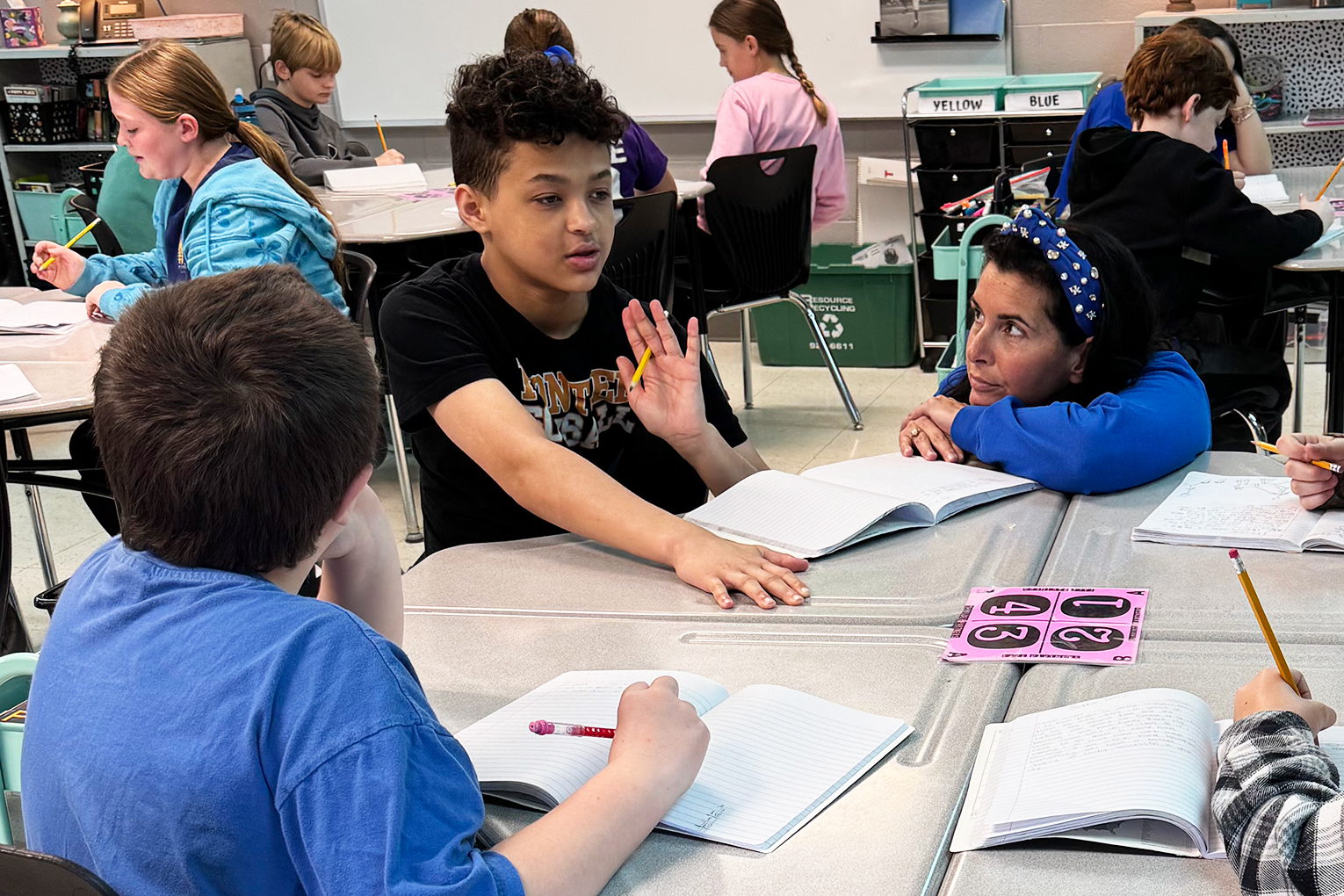
A Harrison County High School student meets with, from left, Counselor Allison Earlywine, Assistant Principal Jenny Nichols, Director of Pupil Personnel Bow Switzer and Chief Academic Officer Jenny Lynn Hatter. Students who are considering leaving school meet with committees tailored to them as part of the district’s effort to help students persist to graduation.
Photo by Mike Marsee, Dec. 13, 2016
By Mike Marsee
michael.marsee@education.ky.gov
When a Harrison County High School student starts looking for the easy way out, he’s going to have to go through a small army of people to get to the door.
Teachers, counselors and administrators are supported by people throughout the community and beyond in their efforts to help students who are struggling or looking to drop out of school.
“If you’re going to go outside the box and you’ve got a great group of people to work with, I think it’s always worth it to go to the mat for a kid,” said Jenny Lynn Hatter, the chief academic officer for Harrison County schools. “We’ve got people who are willing to go to the mat.”
Harrison County’s multi-layered approach includes making sure students know the pathways to graduation that are available to them, identifying students who might be at risk and creating committees tailored to each student to help them persist to graduation. A partnership with University of Kentucky Health Care also identifies and assists students with at-risk behavior that leads to a higher probability of failing or dropping out.
“I think there is the general belief in this community that we’ve got to stop letting our kids cut and run,” Harrison County High Assistant Principal Jenny Nichols said.
Harrison County High’s college- and career-readiness rate climbed to 72 percent last year, and the district’s four-year graduation rate rose to 92.4 percent, higher than the state average. In addition, the school was named a Distinguished School by the Kentucky Department of Education (KDE) last year.
“We began to see that everybody in the building – everyone – is finally beginning to move in the same direction, and the welfare of the child, no matter what their plan is, is at the core of that,” Nichols said.
Christina Weeter, director of KDE’s Division of Student Success, said it’s important for schools and districts to take advantage of any available resources to keep their students in school.
“We know that students have complex and unique issues that can make staying in school a challenge for them, and we know that schools can’t address all those challenges alone, so leveraging other resources in the community, through formal or informal partnerships, is an excellent strategy for meeting students’ unique needs to ensure their success,” Weeter said.
Harrison County took that approach about three years ago when tragedy struck the district. Three Harrison County students committed suicide in a three-month span in 2013 – a large number for a small community – and the Healthy Teens, Beautiful Minds program administered by the adolescent medicine division of UK Health Care’s Department of Pediatrics, was brought to the district.
“We hadn’t had any suicides for 20 years, maybe,” Hatter said.
The program led by Dr. Hatim Omar, director of the adolescent medicine division at UK, and privately funded through grants provides support for at-risk students in grades 6-12, including counseling and medical services within the school.
Students are screened annually using the Perkins Adolescent Risk Screen (PARS), which identifies whether they may be at risk in a wide range of behavioral issues.
The screenings, which are done by UK medical students and school personnel, result in referrals to the free program. Students have access to a mental health counselor each week and to a doctor every other week at school.
“Students are now referring other students because they’ve been helped, and we’ve had lots of calls from parents who are at their wit’s end,” Harrison County High Counselor Allison Earlywine said.
Nichols said she can see changes at the school that she attributes to the program.
“Since Beautiful Minds has been in our building, there certainly is a lot less drama with our kids,” she said. “I think some of our kids are better equipped to handle some of those issues. Since Beautiful Minds has been in the picture, fewer and fewer kids are looking to someone else to fix the problem.”
Earlywine said the program helps keeps students in school by eliminating some of the reasons for absences.
“We had lots of kids with medical issues that weren’t going to the doctor, and that was going to be part of their truancy, and once we got them that help they were able to get back in school,” she said.
Hatter said there also has been a culture change at the academic level when it comes to keeping students in school.
“The thing that I can say about this team is that we have conversations about kids a lot,” she said. “The kids who are wanting to check out and drop out, we don’t buy into that around here. We don’t want kids dropping out. We try to steer them in a different direction.”
Students who are at risk of getting off track can be identified by Nichols, whom Hatter affectionately calls “The Spreadsheet Queen of North America.” Nichols’ spreadsheets are the impetus for action.
“That is what we all jump from,” Hatter said. “You can’t go in to meet a kid and not know what you’re dealing with, what they’ve done in class, what they’re doing on the ACT or the ACT prep.
“We need to go in there with easy, accessible information quickly at a lot of different levels. I think that’s where she really stands out from anybody else in being able to put that together quickly.”
“This is the kind of data-driven decision-making we want to encourage in the districts,” Weeter said. “We have some tools to assist with this, such as the Persistence to Graduation and the Early Warning tools in Infinite Campus, but schools and district are encouraged to use what works best for them and to share what works with others in Kentucky.”
Nichols said she tries to have intentional conversations with students when new scores come to her.
“I’m on them constantly,” she said. “They come immediately to my office to tell me what the score was. They actually beat the email. I have those kids stand there next to me when I put the score in and they see how the spreadsheet changes.”
When school or district personnel identify a students who appears to be off track – or off the school campus – it isn’t long before Bow Switzer’s phone rings.
“At any time, someone could pick up the phone and call someone else and try to gather more information about a particular student,” said Switzer, the district’s director of pupil personnel.
Hatter said those calls also could be about a student who isn’t where he’s supposed to be.
“If I see a kid going down Main Street, we call Bow. We’re a small town and we can track kids,” she said. “Bow probably gets tired of all of us calling him, but he follows up on us.”
Nichols said she shoots straight with students who are seeking her signature when they want to drop out.
“I tell them, ‘Convince me to let you drop out. Convince me to let you lay at home and do nothing while I continue to work really hard,’” she said.
If a student isn’t headed in the right direction, she could find herself at the center of a meeting that could include teachers, administrators, counselors, family resource and youth service center personnel, coaches and even people from outside the school system. No two committees are alike.
“Usually they look at the school level at who can speak to that kid,” Hatter said.
Earlywine said the school has seen changes as a result of the efforts to help students identify pathways to college and career readiness earlier, such as a reduction in discipline problems.
“Discipline referrals have gone down because kids are in classes that they want to be in, and they’re committed to those areas,” she said.
“The conversations with students are changing, the dynamic, the culture in our building is changing. Teachers are having conversations with students about being college and career ready, and their parents understand the language now.”
Hatter said Harrison County’s success is a true team effort.
“It can happen, I think, if you all commit that you’re going to work for the good of the kid,” she said. “If the parents are willing, you get them on board – and most of the time they are willing. Then you’ve got an unstoppable team clicking to get that kid to be college and career ready, to persist to graduation, to do all those things we say we want for kids.”
MORE INFO …
Allison Earlywine allison.earlywine@harrison.kyschools.us
Jenny Lynn Hatter jennylynn.hatter@harrison.kyschools.us
Jenny Nichols jenny.nichols@harrison.kyschools.us
Bow Switzer robert.switzer@harrison.kyschools.us




Leave A Comment